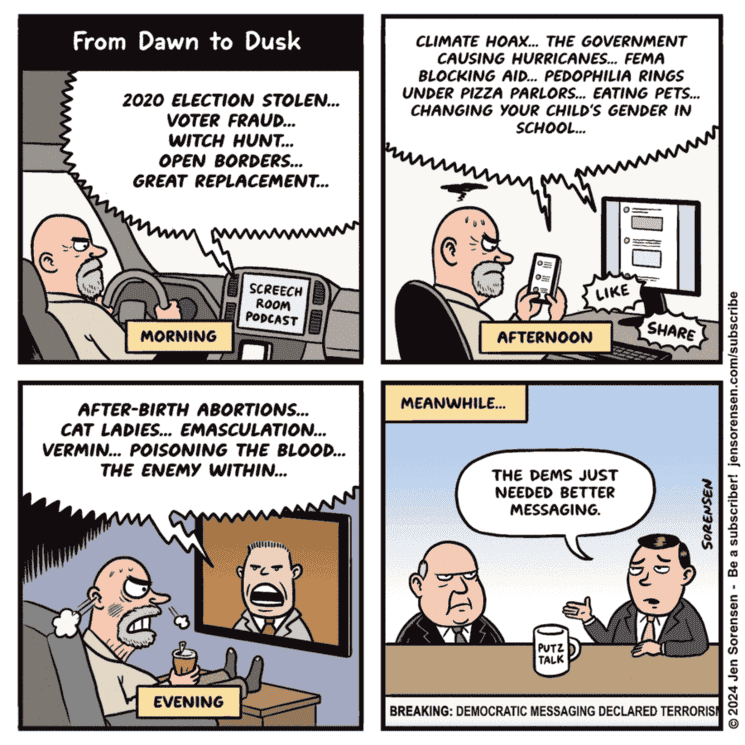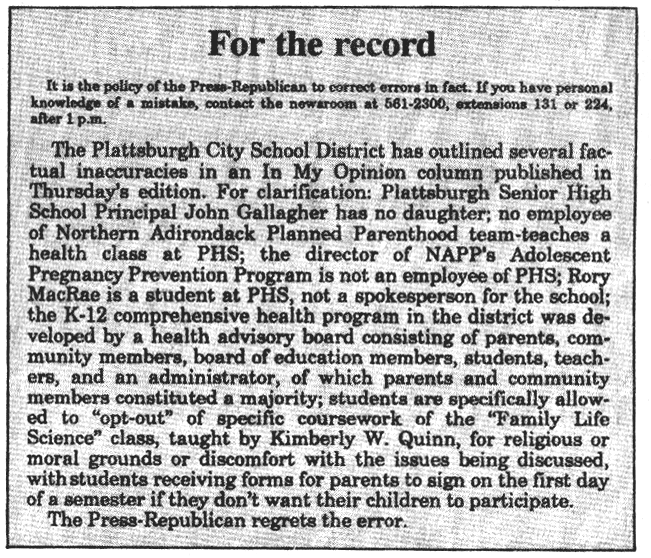CSotD: What’s Logic Got To Do With It?
Skip to comments
Probably should have run this Jen Sorensen piece yesterday with Bob Englehart’s commentary on silos, but her point is more nuanced, because she addresses the issue of the rightwing silo in connection with attempts to explain why the left’s message wasn’t heard.
That first panel echoes the transformation in The Brainwashing of My Dad, which I’ve cited and recommended here before.
I remember the first time I heard Rush Limbaugh. I was driving through Michigan on my way home from my 20th college reunion and came across this radio show that was so off-the-wall that I assumed it was local until I realized he was taking calls from across the nation.
Unlike Jen Senko’s dad, I didn’t find it a bit convincing, but I also didn’t think it was anything that would catch on.
I was right not to believe in him, but wrong about his popularity and influence. I’d already put about 15 years into journalism, including a stint on talk radio myself, so my skepticism was earned, not the result of brilliance.
If I’d been brilliant, I’d have recognized Limbaugh’s potential.

My shortcomings as a soothsayer aside, there was the factor that the Fairness Doctrine had been dropped, and, as Matt Wuerker (Politico) points out, that means that, while free speech is still a principle in our society, it is now something that can be purchased for amplification.
The point of the Fairness Doctrine was that major corporations should not be able to dominate political dialogue, that the little guy should also be able to have his voice heard. But the FCC, and the courts, have concluded that free speech is free but that money is speech and corporations are people and, as Wuerker indicates, the result is that everyone gets to say whatever they want but only the wealthy and powerful get to be heard.
You are no longer given equal time to respond to controversial viewpoints, and those viewpoints are still not required to be logical or factually accurate.
In print, you never really get equal space: A controversial or even erroneous statement that appears bannered on Page One may be contradicted by a small correction the next day on Page Five or a letter to the editor a week later on Page 14.
Here’s my favorite:

For political cartoons, it doesn’t help that most newspaper editors are experts on AP style, grammar and the Oxford comma but completely inept at understanding analogies, metaphors, sarcasm and irony.
They realize that a cartoon character getting a pie in the face is funny, but editorial cartoons are largely beyond their ken, which leads, for example, to this:

An example of the violation of Daniel Patrick Moynihan’s doctrine: Everyone is entitled to his own opinion, but not his own facts, which bears his name though he never claimed to have invented it. Moynihan credited the idea to Bernard Baruch, whose phrasing is less pithy but more to the point:
Every man has the right to an opinion but no man has a right to be wrong in his facts. Nor, above all, to persist in errors as to facts.
GoComics has removed comments from the political cartoons it offers, which allows cartoonists to persist in their errors unchallenged.
Benson may be of the opinion that local police should assist federal immigration officers and that no government should encourage electric vehicles, and her contention that MAGAts are not allowed there is reasonable hyperbole though clearly inaccurate. (Six of California’s past 10 governors were Republican.)
But it would have taken her less than a minute to ask Google “Does California receive more federal funds than it pays?”
Her suggestion that California profits from federal funding is simply wrong. California pays more taxes to Washington than it receives in return.
That’s not an opinion or hyperbole. It’s math.
The state gets the most federal aid, but it has the most people, and it’s low on a per-capita basis, plus it pays more taxes than it gets back.
Let’s be clear: I don’t believe she is deliberately lying. I think she just failed to do her homework. But the impact on public opinion is the same.
A good editor would have spotted it. Articles about which states pay more than they get back are frequent. California pays about five bucks for every dollar it gets back.
I hope any paper running the piece gets letters correcting the mistake, but that brings us back to Boss Tweed and the difference in impact between words and those damned pictures.

Paul Berge addresses a different issue, which is inconsistent values.
It’s possible to agree with Nancy Mace’s contention that transexual people should be required to use restrooms and dressing rooms consistent with their gender at birth. I think it’s ignorant and bigoted, but I understand how an ignorant person might feel that way.
What is beyond opinion, logic and intelligent thinking is to object to that while supporting a president who boasts of barging into the dressing room at a beauty pageant to ogle naked underage girls and who pushed his way into a department store dressing room to sexually assault a woman.

Berge obviously drew his cartoon before the second sexual predator he depicts had made yesterday’s announcement, as addressed here by Clay Bennett (CTFP).
Gaetz withdrew from consideration after meeting with a group of Senators, which makes me suspect that they told him he didn’t have a chance in hell of being confirmed but had an excellent chance of being dragged through a lot of mud, mostly of his own making.
Hence Bennett’s depiction of a completely exposed Gaetz using his withdrawal in an attempt to cover his nakedness.

I use a lot of Bennett’s cartoons, which makes me feel somewhat guilty, but I am a fan in particular of his ability to depict dumbfounded people, as he did when we were invading Iraq.
This military officer is an innocent pawn in someone else’s game, but Gaetz is shown more as a privileged person who assumed he was invulnerable and only now realizes he has to play by the rules after all.
It’s a different kind of dumbfounding, which I mark by skipping our usual musical ending for this John Ciardi poem, which, in high school, I had pinned on the bulletin board in my bedroom:
On Flunking a Nice Boy Out of School
I wish I could teach you how ugly
decency and humility can be when they are not
the election of a contained mind but only
the defenses of an incompetent. Were you taught
meekness as a weapon? Or did you discover,
by chance maybe, that it worked on mother
and was generally a good thing —
at least when all else failed — to get you over
the worst of what was coming. Is that why you bring
these sheepfaces to Tuesday?
They won’t do.
It’s three months work I want, and I’d sooner have it from the
brassiest lumpkin in pimpledom, but have it,
than all these martyred repentances from you.


Comments 10
Comments are closed.